Vasyl Vyshyvanyi. A Military Figure, Politician, Diplomat and… Intelligence Officer
10/29/2021
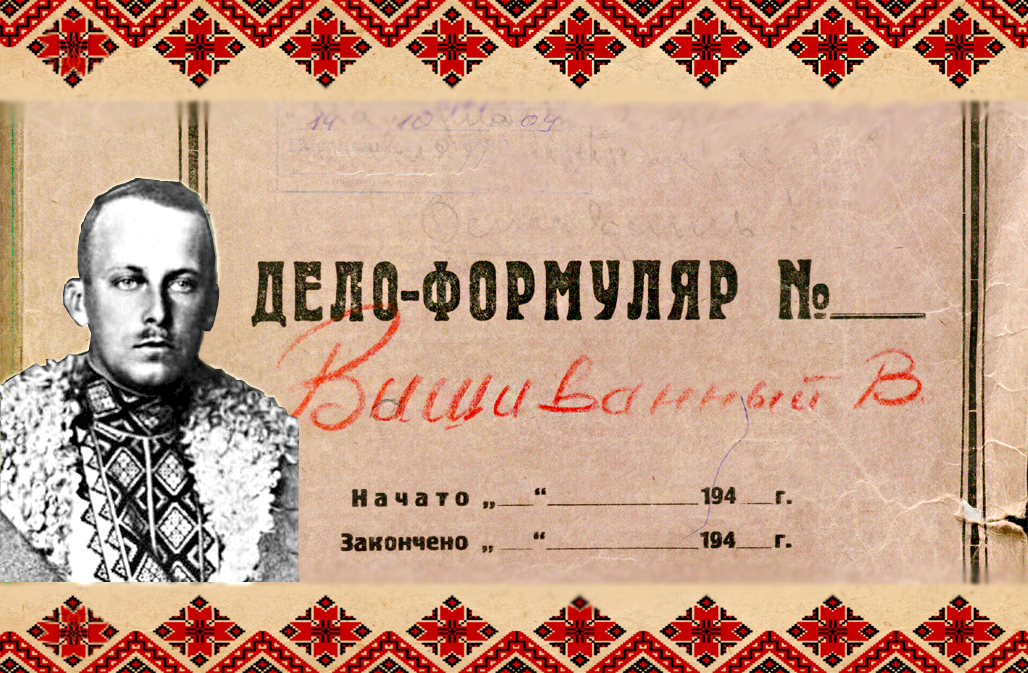
Recently, there has been a growing interest in extraordinary colorful figures in Ukrainian history, whose names were forgotten in Soviet times. Among them is the Austrian Archduke Wilhelm Franz von Habsburg-Lothringen, known as Vasyl Vyshyvanyi, who played a prominent role in the Ukrainian national liberation movement. Declassified documents from the archives of the Foreign Intelligence Service of Ukraine, earlier unknown to the general public, make it possible to clarify and supplement the available information about him as a military figure, politician, diplomat and, to some extent, an intelligence officer.
Judging by most of the documents collected in his small case file, it was formed by the Ministry of State Security of the USSR in 1947. It was then, after the Second World War, that the MGB was tasked with intensifying its activities against foreign centers of Ukrainian emigration and its influential figures. A number of well-known leaders of the OUN, the UPR, the Hetman's movement, and other currents and organizations from the prewar period, were declared wanted. Therefore, according to the established scheme, for this purpose were used all operative intelligence and technical measures, as well as the abilities of the Soviet military administration and groups of Soviet troops’ temporary presence on the territory of Germany, Austria and other European countries.
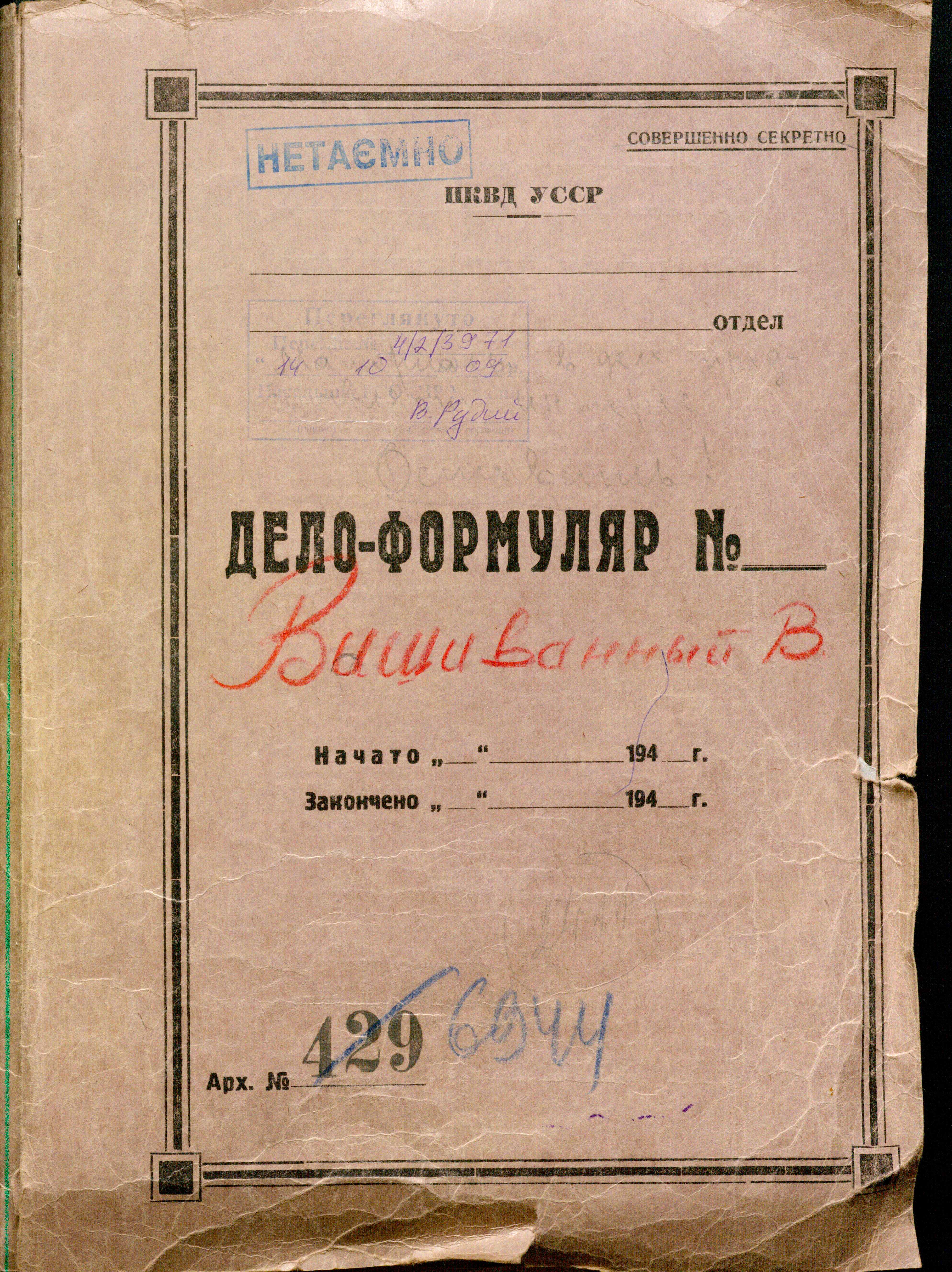 Among others, Vasyl Vyshyvanyi, who at the time lived in Vienna, in the British occupation zone, came into the field of view of Soviet secret services. They began to actively collect information on him. At this, a number of the documents attached to the case date back to the 1920s and 1930s - extracts from informations, informant reports, as well as some originals of special messages. In order to get a complete picture of Vyshyvanyi’s so-called anti-Soviet counter-revolutionary activities, the Chekists resorted to a thorough study of archival letter-coded files for the past years. From the scattered materials, the image of a convinced, consistent, ardent fighter for Ukrainian interests with great influential connections appeared before them.
Among others, Vasyl Vyshyvanyi, who at the time lived in Vienna, in the British occupation zone, came into the field of view of Soviet secret services. They began to actively collect information on him. At this, a number of the documents attached to the case date back to the 1920s and 1930s - extracts from informations, informant reports, as well as some originals of special messages. In order to get a complete picture of Vyshyvanyi’s so-called anti-Soviet counter-revolutionary activities, the Chekists resorted to a thorough study of archival letter-coded files for the past years. From the scattered materials, the image of a convinced, consistent, ardent fighter for Ukrainian interests with great influential connections appeared before them.
Wilhelm Habsburg-Lothringen was a representative of one of the monarchical dynasties of Europe, which in the early twentieth century ruled Austria-Hungary. His father and older brother claimed the Polish throne in case of the collapse of the Empire. Instead, Wilhelm had earlier made a choice in favor of Ukrainians and Ukrainian idea.
In 1915 he graduated from the Military Academy, became a Lieutenant in the Armed Forces of the Austro-Hungarian Empire and was assigned to the Uhlan Regiment, most of the soldiers in which were Ukrainians. As a result of communication with them, as well as his travels through Hutsul villages in his young years, he fell in love with Ukrainian culture, customs, and songs. He soon learnt the Ukrainian language and even wrote poems in Ukrainian. In 1916, as a member of the Austro-Hungarian Parliament, he met a number of Ukrainian politicians and began lobbying Ukrainian interests at a high political level.
During the conclusion of the Brest Agreement in 1918, Wilhelm Habsburg provided significant assistance to the Ukrainian delegation through his ties in Austrian government circles. And then, according to the signed agreement, he found himself in Ukraine as part of the German-Austrian military contingent. At the head of one of the formations, he was in Kherson and Oleksandrivsk. There he gained authority from the locals, co-worked with Prosvita, visited landmarks of Cossack glory, and became close to some commanders of the UPR Army, who offered him to join the overthrow of Hetman Pavlo Skoropadskyi and even to head the Ukrainian state. But he flatly rejected the offer.
His warriors repeatedly presented him with embroidered shirts, which he fondly wore. For them he got his nickname - Vasyl Vyshyvanyi (Embroidered- transl.), which he honorably bore throughout his life.
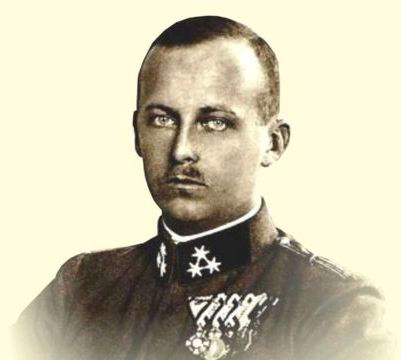 These and other biographical facts are mentioned repeatedly in the case file and in general do not differ from what is already known to researchers. Along with this, there is information that may have been preserved only in archival intelligence documents. For decades, it had been marked as “top secret”.
These and other biographical facts are mentioned repeatedly in the case file and in general do not differ from what is already known to researchers. Along with this, there is information that may have been preserved only in archival intelligence documents. For decades, it had been marked as “top secret”.
For example, there are many mentions of who and how instilled in Vasyl Vyshivanyi a love for everything Ukrainian and taught him the Ukrainian language. In the intelligence archives there is a report of the USSR State Security Service agent Chaban dated July 7, 1945, about how Myron Lutskyi (Lutskyi is mentioned by the name of Ostap in other documents), who after the 1917 revolution in the Russian Empire, went to serve in the Legion of Ukrainian Sich Riflemen and was soon appointed Adjutant to Vasyl Vyshyvanyi.
The document reads:“Myron Lutskyi taught Archduke Wilhelm Franz von Habsburg-Lothringen – Vasyl Vyshyvanyi - the Ukrainian language, introduced him to Ukrainian history and culture, taught him Ukrainian songs, dances, introduced him to Ukrainian life, customs, Ukrainian moonshine and girls. He accompanied him from the Zbruch to Yelysavethrad, and then to Oleksandrivsk on the Dnieper. He showed him the ruins of the Zaporizhzhian Sich, where the Ukrainian Sich Riflemen would come and camp. He took him to places and introduced him to prominent Ukrainian figures, campaigned for this Habsburg, made him popular in Ukrainian circles and among the Ukrainian population” (BSA of the SZR of Ukraine. - F. 1. – Case 6944. - Vol. 1. – P. 87).
The document also states that Vasyl Vyshyvanyi soon fired this adjutant for a number of reasons. Therefore, these and other intelligence statements should be treated with caution, as they may reflect some of the subjectivity of the events of that time. Like another adjutant, Rudezh Larishenko (also referred to as Eduard Larichenko)’s report to the People’s Commissariat for Foreign Affairs of the USSR regarding contacts with Vyshivanyi. The document is dated June 17, 1932, when Larishenko had already returned to Ukraine from abroad with the intention, as he noted, “to work in the ranks of the Ukrainian proletariat”.
In his report, he wrote that he met Wilhelm Habsburg-Lothringen in early 1915, when the Archduke arrived in Lviv to continue his service in the 4th Cavalry Division, where Larishenko was already an officer. Allegedly, they immediately became friends and later maintained close contacts. During the national liberation struggle, Larishenko fought in the ranks of the Ukrainian Galician Army (UGA). And Vasyl Vyshyvanyi, according to him, at that time, at the insistence of the government of the Western Ukrainian People's Republic, was temporarily in the monastery of St. Basilians in Buchach, so as not to cause dissatisfaction on the part of the Entente countries with what was happening in Western Ukraine. That is, he realized that at that time because of him ZUNR (WUPR) could have certain problems, so he went to voluntary internment.
The next few months of Vasyl Vyshyvany's life in the spring and summer of 1919 are described differently by researchers. In particular, there is a mention that after six months of living in the monastery, in June, during his trip to the Carpathians, he was arrested by Romanians, held captive for three months and released. And the leadership of the Ukrainian People's Republic allegedly contributed to this.
In archival intelligence documents, this “journey” through the Carpathians is depicted differently. Vasyl Vyshyvanyi himself explained in the interrogation report to the investigators of the Ukrainian State Security Service on April 14, 1948, that he intended to reach Austria through Romanian territory, but was arrested by Romanians at the border. After his release, he allegedly asked to be returned to Ukraine.
In another archival document, an unnamed source states: “When Eastern Galicia was occupied by Poland in 1919, Vyshivanyi moved to Romania in the hope that the Romanian Queen, his relative, would give him some care and assistance, but the Romanian General Staff was hostile to Vasyl Vyshyvanyi because of his relations with Ukrainians. He was interned, and then allowed to come to Kamyanets-Podilskyii, where Petliura made him a Colonel at the General Staff”(BSA of the SZR of Ukraine. - F. 1. – Case 6944. - V. 1. - P. 87).
Adjutant Larishenko's testimony states that in March 1919, Vasyl Vyshyvanyi obtained permission from the dictator of the Western Ukrainian People's Republic, Yevhen Petrushevych, for a kind of intelligence and sabotage campaign to the rear of Romanian troops occupying the Hutsul region at the time. The aim of the raid, as noted in the document, was to organize an uprising of the local population in case of intensification of hostilities.
“We crossed the Romanian border at night”, Larishenko testified, “having hidden the car, and advancing all night, we arrived on the outskirts of Zhabye. There we changed into peasant clothes and for 5 weeks walked from house to house. As the car was found at that time, the order of the Romanian command about our arrest and a reward to the person who would betray us was posted everywhere.
After 5 weeks, we were tired, and we came to Zhabye, where we read the warrant for our arrest on the church door. On the second day of the Trinity, the manager of the estates of Count Skarbko recognized us and gave us away to the Romanian Command. We were staying overnight at the priest’s house. About 3 am two Romanian hundreds with 8 machine guns surrounded the house and captured us.
We were taken under heavy guard to Kaldurushany, where we were detained for three months. Then we were convoyed to Ukraine”(BSA of the SZR of Ukraine. - F. 1. – Case 6944.– V. 1. - P. 11).
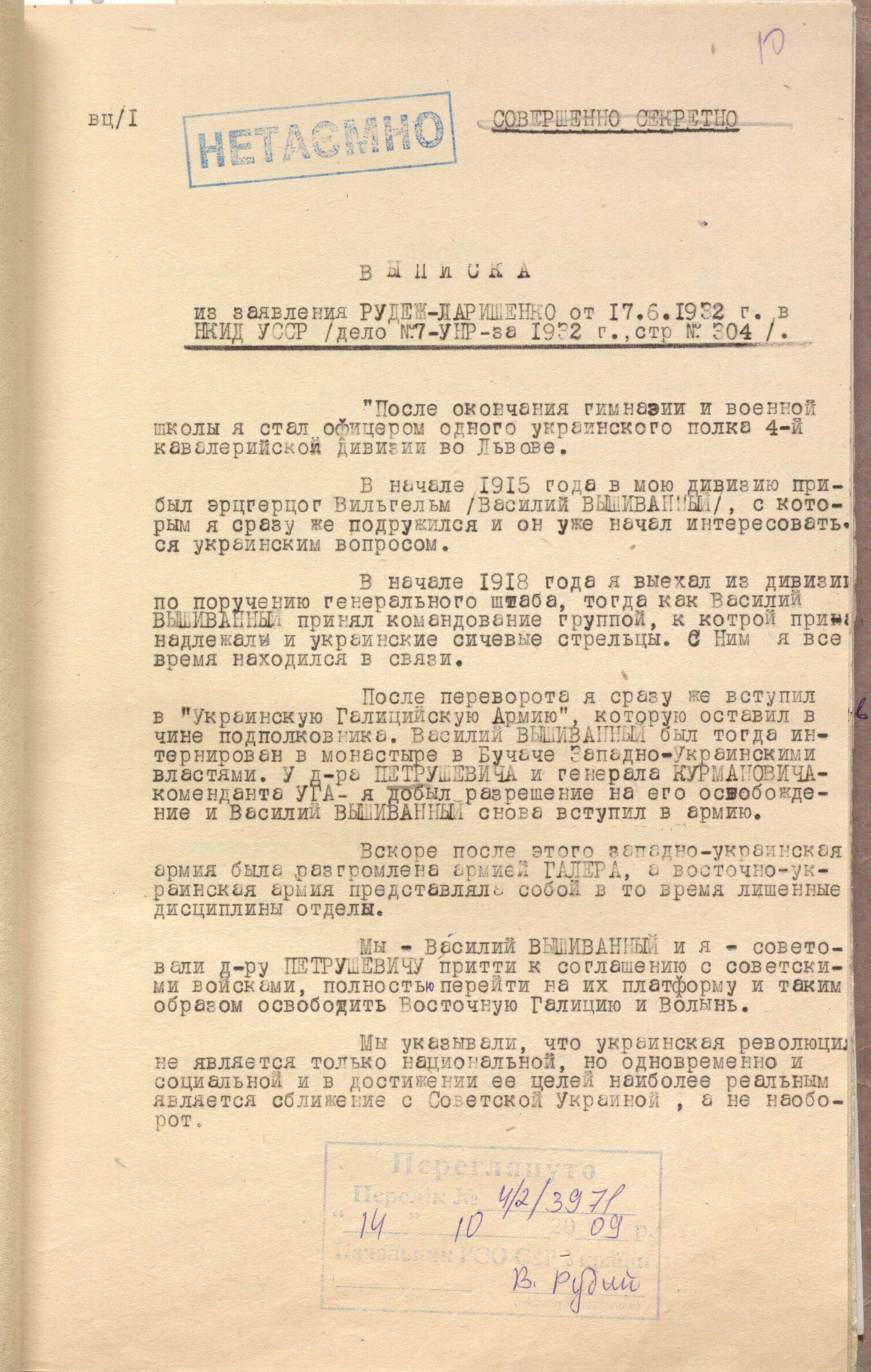
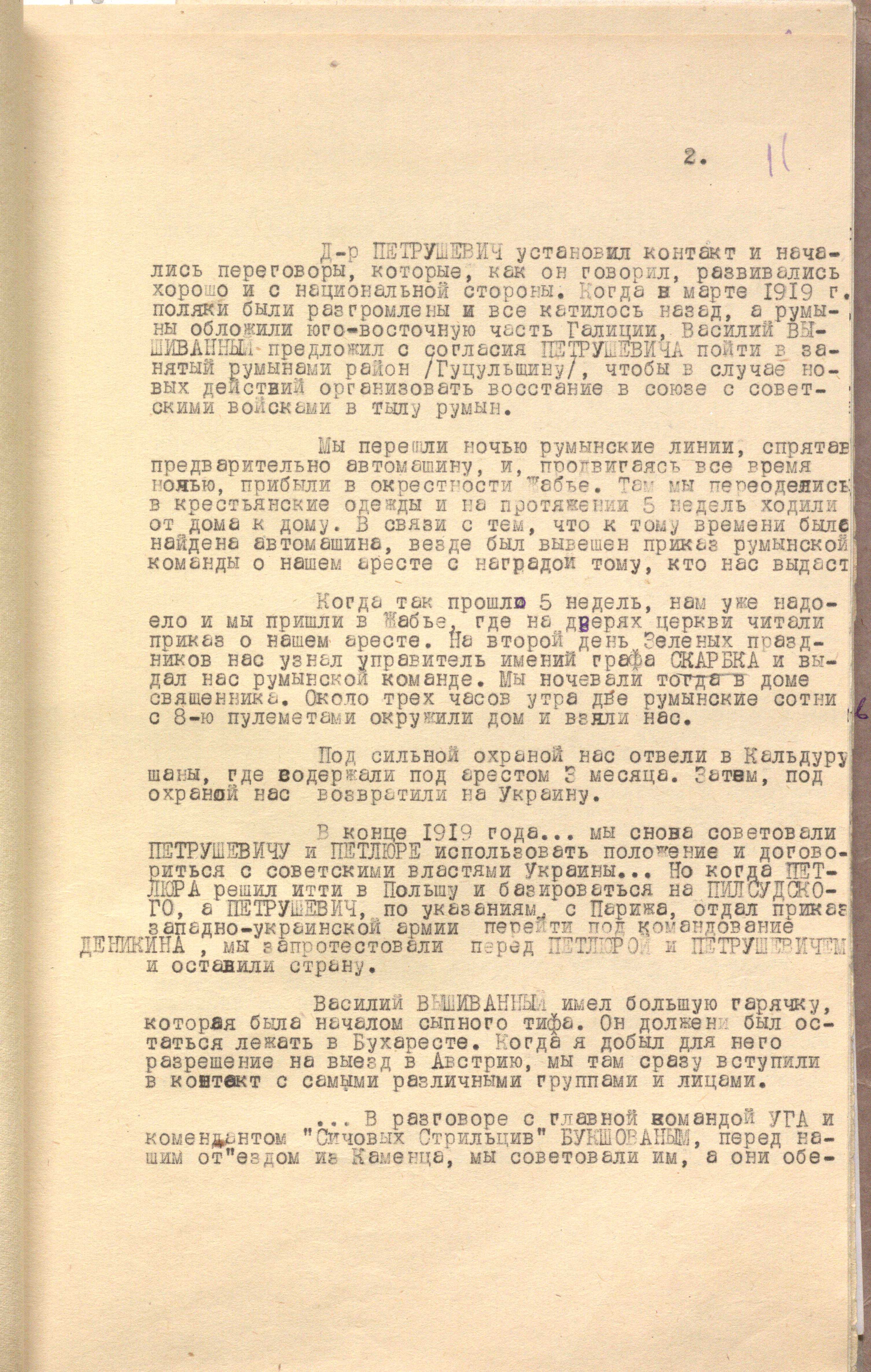

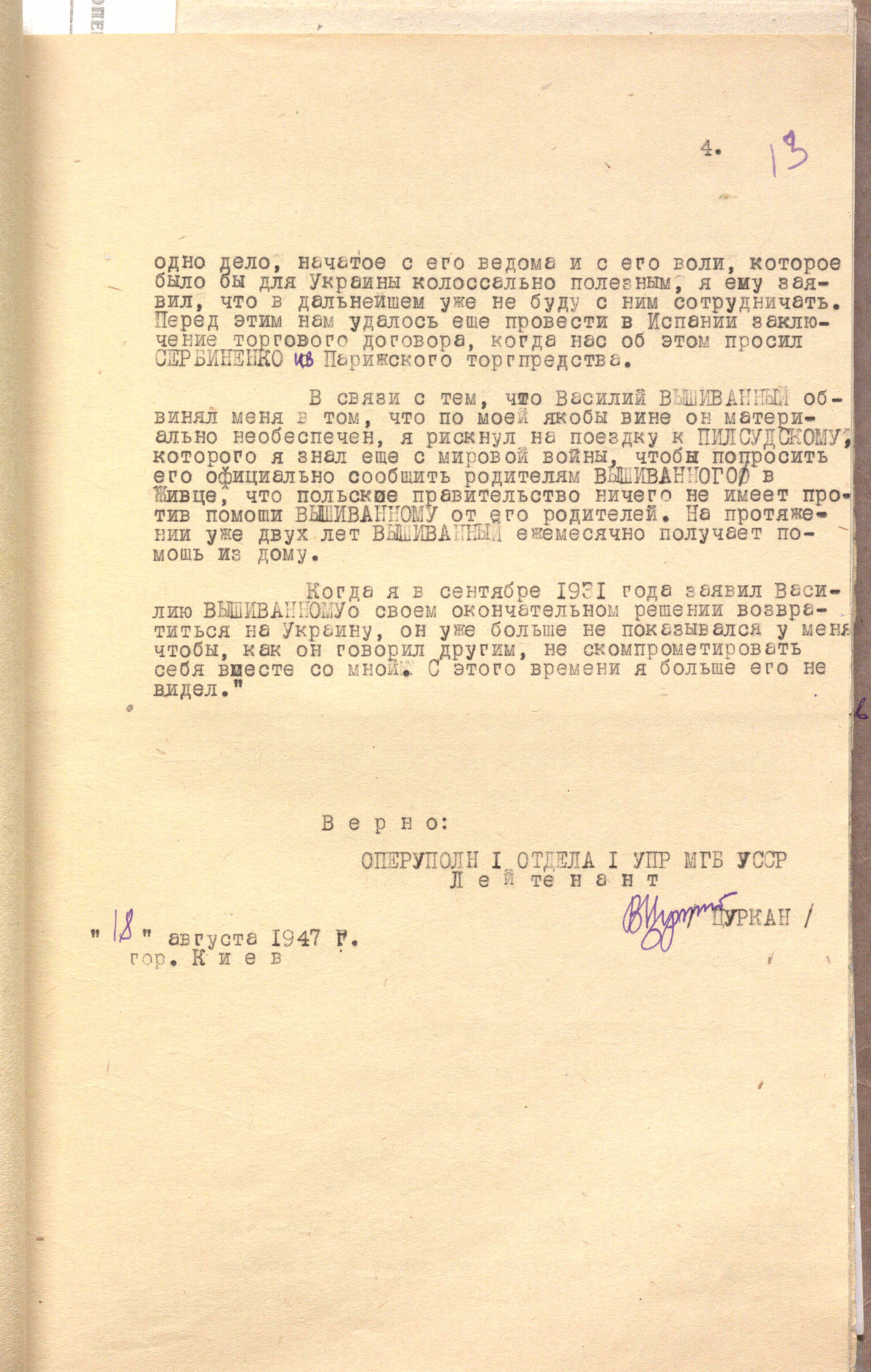 Adjutant Larishenko was with Vyshivanyi for another more than ten years, until the early 1930s. All this time the Archduke trusted him in every way. In particular, the Adjutant, according to his written testimony, obtained permission for Vyshivanyi to leave for Austria at the end of 1919, when he was in Budapest and was seriously ill. At the same time, he (risking his life) allegedly made his way to Vienna through Romania and handed to Volodymyr Vynnychenko a letter from Vyshyvanyi with information about the plans for a Polish offensive. He and Vyshyvanyi took part in negotiations with the new Hungarian leadership, “to include about 30,000 Ukrainians in the Hungarian army they were creating, as a separate formation, to prevent Galicia and Volhynia from becoming Polish again”. But to no result. He also allegedly unsuccessfully visited the then Minister of Defense of Poland, Józef Pilsudski, to ask Vyszyvany's father, who lived in Zywiec, Poland, for financial assistance to his son.
Adjutant Larishenko was with Vyshivanyi for another more than ten years, until the early 1930s. All this time the Archduke trusted him in every way. In particular, the Adjutant, according to his written testimony, obtained permission for Vyshivanyi to leave for Austria at the end of 1919, when he was in Budapest and was seriously ill. At the same time, he (risking his life) allegedly made his way to Vienna through Romania and handed to Volodymyr Vynnychenko a letter from Vyshyvanyi with information about the plans for a Polish offensive. He and Vyshyvanyi took part in negotiations with the new Hungarian leadership, “to include about 30,000 Ukrainians in the Hungarian army they were creating, as a separate formation, to prevent Galicia and Volhynia from becoming Polish again”. But to no result. He also allegedly unsuccessfully visited the then Minister of Defense of Poland, Józef Pilsudski, to ask Vyszyvany's father, who lived in Zywiec, Poland, for financial assistance to his son.
Instead, the NKVD’s report “On Vasyl Vyshyvanyi” dated July 25, 1934, states that Vyshyvanyi, on his return from Paris to Vienna and visiting his acquaintance Baron Wisner, “told off his former Adjutant Eduard Larichenko, explaining that he was forced to dismiss him, as the Paris prefecture provided evidence that Larichenko was working for the Soviets”.
The documents collected in the Intelligence’s archive do not reflect the entire life of Vasyl Vyshyvanyi, but mostly his stay outside Ukraine in the 1920s and 1930s. The Chekists were more interested in whether he would continue to defend the idea of Ukraine's existence as an independent state entity, whether he would have ambitions to run for the head of the Ukrainian emigration, and what efforts he would make to do so with a wide range of influential acquaintances in Europe, whether he would plan any actions against the USSR. That is, in tracking his actions, everything that fell under the concept of “anti-Soviet counter-revolutionary activity” was taken into account.
“After the defeat of Petliura's army”, says one of the papers, “Vyshyvanyi moved to Vienna, where in 1921-1922 he founded a committee to conduct intelligence and sabotage work against the Soviet Union. The committee included well-known Ukrainian nationalists Poltavets-Ostryanytsya, Petro Butenko, Biberovych, in addition, many people were involved to cooperate in military, political and editorial affairs” (BSA of the SZR of Ukraine. - F. 1. – Case 6944.– V. 1. - P. 98). This was the so-called Ukrainian National Free Cossack Society. It is mentioned that he received significant subsidies for this activity from Hungarian and German circles, for which he began to publish the newspaper Soborna Ukraina and organize other events. But soon due to controversy, the Society had to be liquidated.
Regarding those events, some studies point out that Vyshivanyi was poorly versed in the political intrigues of the Ukrainian emigration, but after a while he allegedly realized that he was just being used, so since 1922 he actually stayed off any political activity.
On the contrary, documents from the intelligence archives show that he never abandoned the Ukrainian cause. One of the references, dated 1926, states that Vyshivanyi is making some efforts “among the royal courts of Spain, England and Italy to gain support in his plans to establish a kingdom in Ukraine. No matter how they treat it, the fact is that Vyshyvanyi, together with the former Ambassador of the Ukrainian People's Republic Poletika and his Adjutant Laroshenko, visited Madrid, London and Rome in the above-mentioned matters” (BSA of the SZR of Ukraine. - F. 1. – Case 6944.– V. 1. - P2).
Another document refers to Vyshivanyi’s participation in the Hetman's Congress of Supporters of Pavlo Skoropadskyi in Munich in 1927. It is a copy of the letter (dated October 20, 1927) of the UPR Consul in Munich Vasyl Orenchuk to the Minister of Foreign Affairs of the UPR, intercepted by the Chekists. It states that the Ukrainian issue was the main one at the Congress. During its discussion, the Hetmanites talked a lot about a possible federation with Russia. “Only Vasyl Vyshyvanyi alone- reads the letter - defended the independence of Ukraine. Vyshyvanyi also proposed the thesis of the unity of the Ukrainian lands, adopted by the Congress” (BSA of the SZR of Ukraine. - F. 1. – Case 6944. - Vol. 1. - P. 3).
 Differences in the views of Vasyl Vyshyvanyi and Pavlo Skoropadskyi are also mentioned in a number of other archival documents. At this, the GPU-NKVD reports state that the Archduke allegedly criticized the Hetman in British and Italian government circles, arguing that he was unpopular in Ukraine and that the Hetman's supporters’ actions against the Soviet government were doomed to failure because they would not be supported by Ukrainians. Besides, emphasis is placed on the fact that Vyshivanyi intensified his activities in England and Italy, where he expected to receive funds for a coup in Ukraine. “His whereabouts”, reads the paper, “are now Paris and its outskirts. He bought a villa near Paris, which is a place of secret meetings for all his agents”.
Differences in the views of Vasyl Vyshyvanyi and Pavlo Skoropadskyi are also mentioned in a number of other archival documents. At this, the GPU-NKVD reports state that the Archduke allegedly criticized the Hetman in British and Italian government circles, arguing that he was unpopular in Ukraine and that the Hetman's supporters’ actions against the Soviet government were doomed to failure because they would not be supported by Ukrainians. Besides, emphasis is placed on the fact that Vyshivanyi intensified his activities in England and Italy, where he expected to receive funds for a coup in Ukraine. “His whereabouts”, reads the paper, “are now Paris and its outskirts. He bought a villa near Paris, which is a place of secret meetings for all his agents”.
Documents dating from the 1930s also refer to the intensification of Vyshivanyi's activities. Thus, a letter from Kharkiv to the Foreign Department of the OGPU of the USSR in Moscow dated April 9, 1933, states: “Our foreign source in Romania, known to you as Teplov, reports that Romanian intelligence received a letter from Vasyl Vyshyvanyi (former Prince of Habsburg, a candidate for the Hetmanate of Ukraine), in which he offered his services to Romania and asked for permission to transfer his agents through the Romanian border for work in Ukraine. In his turn, Vyshyvanyi promises to provide the Romanian intelligence with military information from his agents. The Romanians accepted this offer, and Bucharest sent a letter from Vyshyvanyi to the Chernivtsi Center “A” (BSA of the SZR of Ukraine. - F. 1. - Case 6944. - V. 1. – P. 15).
The archives contain information about Vyshyvanyi's ties with Bulgarian intelligence and that he used the support of Polish military circles in conducting intelligence work against the USSR.
These reports of the GPU may give the impression that Vyshyvanyi at that time, was doing nothing but sending agents to Soviet territory, engaged in intelligence activities, and had his own extensive network for this purpose. In fact, the Chekists deliberately exaggerated their conclusions, as they had repeatedly done, in order to demonstrate the growing threat from abroad and to justify the intensification of repressive measures within the country.
But the Chekists' concern about Vyshyvanyi's contacts with OUN leaders had real grounds. One of the documents states that as of 1933 his ties with the OUN and personally Yevhen Konovalets, as well as Mykola Stsiborsky, Viktor Kurmanovych, Mykola Kapustyanskyi, and Petro Kozhevnikov were recorded. Another paper says that during his communication with Konovalets, Vyshivanyi admired the work of General Oleksandr Udovychenko and insisted on involving him in the work.
Such cooperation is also mentioned in the archive case on E. Konovalets. The special report of the Foreign Department of the UGB of the NKVD of the USSR of June 23, 1935 “Organization of Ukrainian Nationalists” states: “The resolution of the July 1933 conference under the “leader” created the Military Staff of the OUN… Konovalets is the Chief of the Staff. The members of the Staff are Khorunzhyi -General- Victor Kurmanovych, Anton Kraus, Vasyl Vyshyvanyi…” ( BSA of the SZR of Ukraine. - F. 1. – Case 6964.– V. 1. – P. 57).
Vasyl Vyshyvanyi's contacts with Yevhen Konovalets are discussed more in the archival case of the OUN representative in London Yevhen Lyakhovych. It contains a document dated July 1936, which states that the Chekists purposefully gave one of the agents in Ukrainian emigrant circles the task: “to find out whether they are currently staying in touch with each other and what relations exist between them”.
According to the archival document, the agent met with Vyshyvanyi twice to fulfill this task and learnt from him that he had known Konovalets since the First World War. “A few years ago Konovalets visited him in Paris several times. Konovalets asked Vasyl Vyshyvanyi to arrange his (Konovalets’) contacts with the Japanese, which Vasyl Vyshyvany did, and he introduced Konovalets to the then Japanese Counselor of the Embassy in Paris, Baron Ito” (BSA of the SZR of Ukraine. - F. 1. – Case 9860. V. 2. - P. 172).
Therefore, there is some reason to believe that Vyshyvanyi was involved in conducting secret, partly intelligence activities in the interests of Ukrainian organizations abroad. And, as he was accused in the materials of the investigation - in the interests of French and British intelligences. But then, in the conditions in which the Archduke found himself, and in the situations to which he was bound by fate, he was simply doomed to act as an intelligence officer.
Vasyl Vyshyvanyi is mentioned in the case of the prominent artist Mykola Hlushchenko, who in the 1930s worked in France as an agent of the Soviet Foreign Intelligence. Those materials state that before Hlushchenko returned to the USSR in October 1934, he was given the task of resuming contacts with leaders of the Ukrainian emigration. Among others was Vasyl Vyshyvanyi, with whom he was acquainted. However, Hlushchenko was recommended not to impose himself, so as not to arouse unnecessary suspicion. There is no information in the case file about their meeting, if it ever took place. But in one of the documents of the Foreign Department of the NKVD of the USSR, there is the following phrase: “We sanctioned the residentura’s plan for Vyshyvanyi’s double-crossing the “Artist”.
These short pieces of information may indicate that the Paris-based station of the Soviet intelligence was developing a number of operations in which Vyshyvanyi was both an object and a subject of operational interest. The solution to this story can be found in one of the documents dated September 20, 1947, entitled “Information on Vasyl Vyshyvanyi”. It states: “In 1935, the Paris residentura of the GUGB of the NKVD of the USSR recruit cultivated Vyshyvanyi”. But, apparently, all the measures of study, ideological bombardment and provocations with the involvement of the agents in his environment, about which there is no information in archival documents, did not give the expected result. Therefore, the conclusion was as follows: “It was decided to give up the cultivation and further use of Vyshyvanyi” (BSA of the SZR of Ukraine. - F. 1. – Case 6944. - Vol. 1. – P. 100).

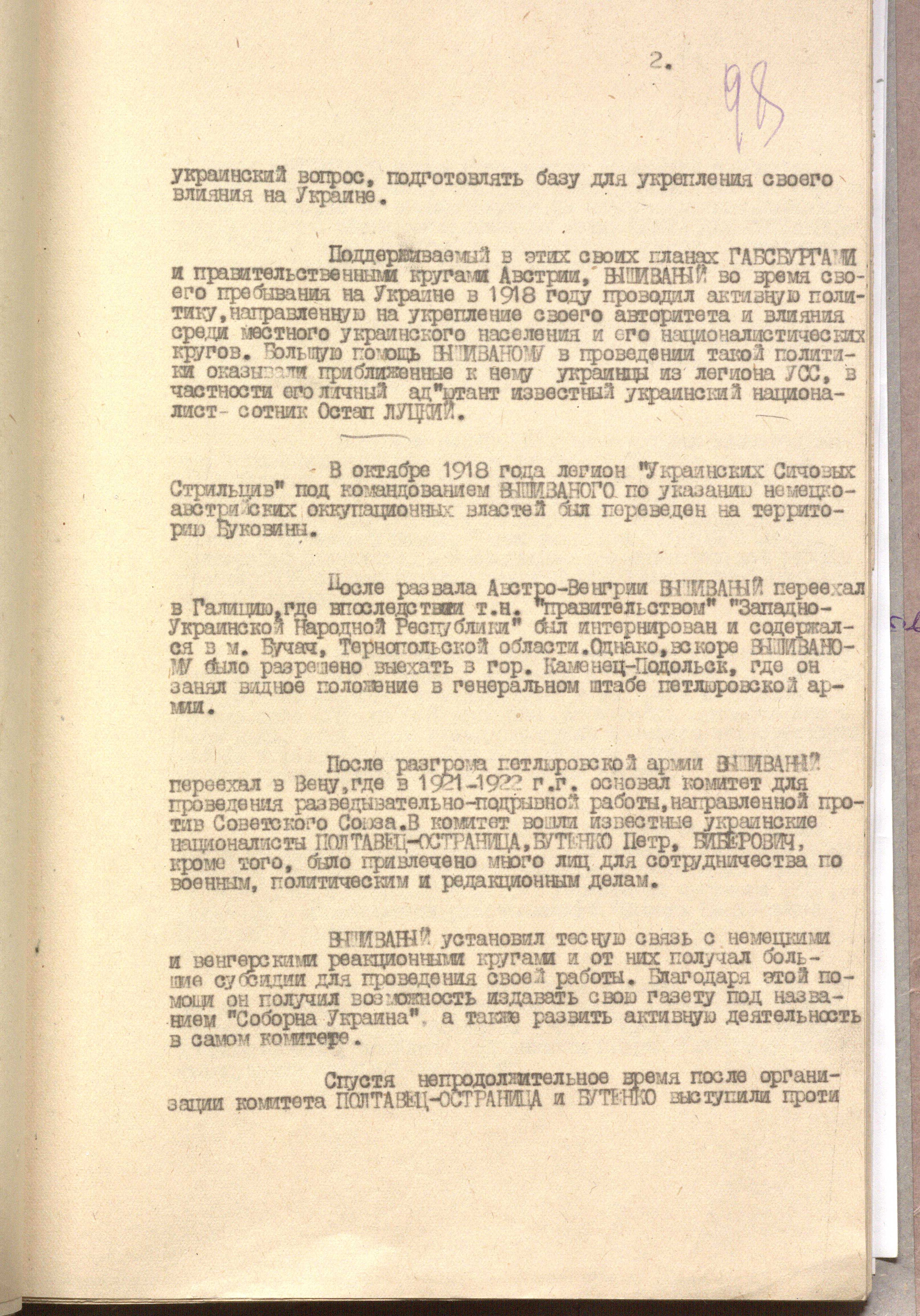
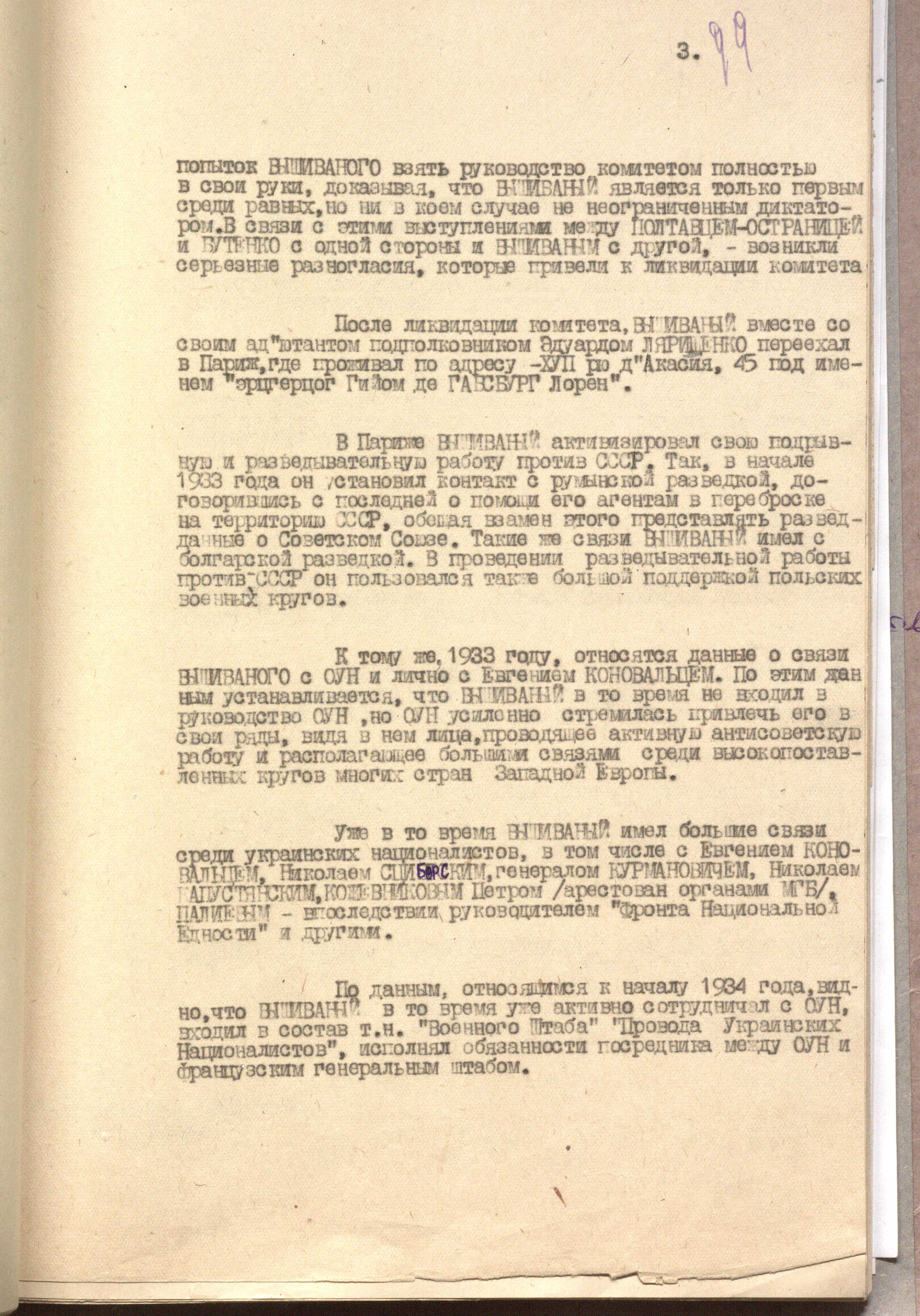
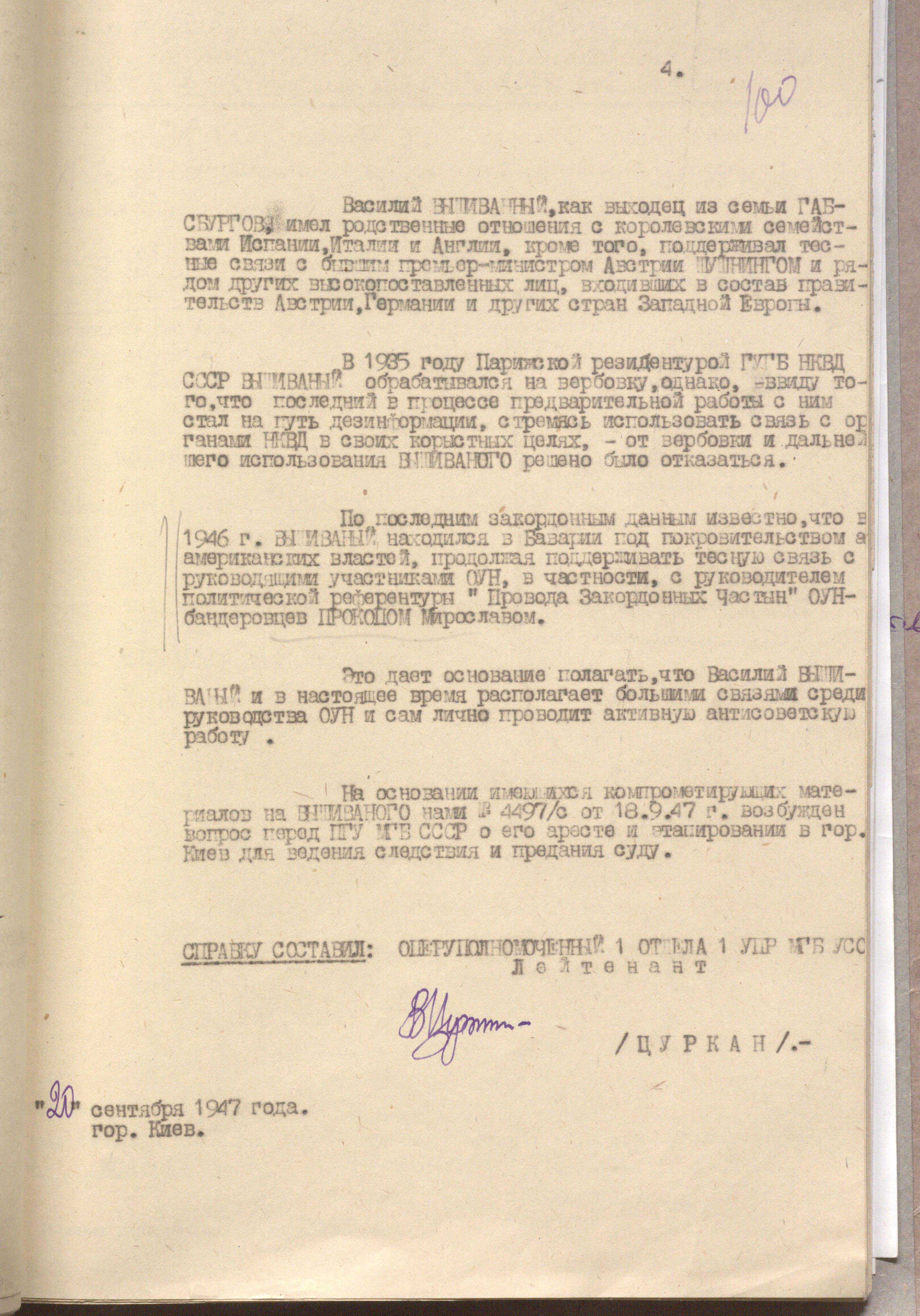 The surveillance of Vasyl Vyshyvanyi carried out by the Soviet secret services after the Second World War, in particular with the active participation of SMERSH - military counterintelligence, showed that it was already a question of neutralizing and stopping his anti-Soviet activities. Although he did not publicly oppose the policy of the USSR. But his contacts with OUN leaders were enough for him to be considered an enemy of the Soviet power.
The surveillance of Vasyl Vyshyvanyi carried out by the Soviet secret services after the Second World War, in particular with the active participation of SMERSH - military counterintelligence, showed that it was already a question of neutralizing and stopping his anti-Soviet activities. Although he did not publicly oppose the policy of the USSR. But his contacts with OUN leaders were enough for him to be considered an enemy of the Soviet power.
The final paper from the archival case states: “According to the latest information from abroad, in 1946 Vyshyvanyi was in Bavaria under the auspices of the American authorities, continuing to maintain close ties with OUN leaders, in particular, with the head of the political office of the OUN-Bandera Foreign Forces Myroslav Prokip. This gives grounds to believe that Vasyl Vyshyvanyi still has great ties with the OUN leadership and personally carries out active anti-Soviet work”. (BSA of the SZR of Ukraine. - F. 1. – Case 6944.– Vol. 1. - P. 100).
According on archival documents, on September 18, 1947, the MGB of the USSR raised before the First Main Directorate (Foreign Intelligence) of the MGB of the USSR the question of arresting Vyshyvanyi and his transfer to Kyiv for investigation and conviction. It is unknown why this date appears in the case, because on August 26, 1947, Vyshyvanyi was abducted by SMERSH workers in the British-occupied zone of Vienna and taken to Carlsbad Prison, where a preliminary investigation was conducted. Probably, in this way they wanted to more or less normalize procedural actions. Therefore, in the investigative documents, the date of his arrest is September 22.
Two months earlier, Soviet special services had also secretly abducted Ukrainian Roman Novosad, a student at the Vienna Academy of Music, through whom Vyshyvanyi was trying to re-establish contacts with the OUN. Both were soon taken to Kyiv, to Lukyanivka Prison. According to the materials of the investigation, which are in other state archives, Vasyl Vyshyvanyi was accused of ties with the OUN, cooperation with French and British intelligences.
The State Security Committee of the Ukrainian SSR completed the investigation in May 1948. Vasyl Vyshyvanyi was sentenced to 25 years in prison in Volodymyr Prison in Moscow. But he never made it to the place of destination. He died on August 18, 1948, in Lukyanivka Prison Hospital after a sharp deterioration in his health. His burial place is still unknown. Such was the tragical end of the life of the Austrian Archduke Wilhelm Franz von Habsburg-Lothringen in his spiritual homeland - Ukraine.
